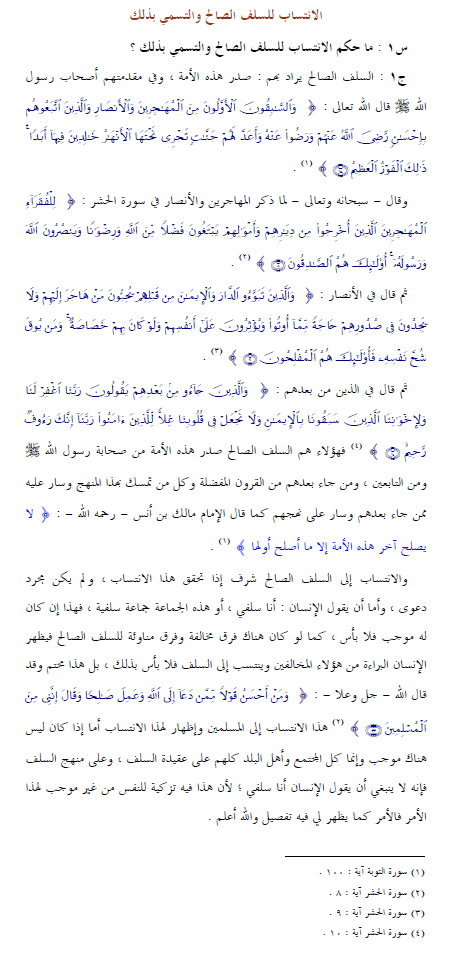
Friday, August 31 2012 - by Manhaj.Com
Read more articles at Manhaj.Com

In the third volume of Muhaadaraat Fil-Aqeedah wal-Da'wah of Shaykh Saalih al-Fawzaan, the following question occurs:

Translation
What is the ruling on ascribing to the Righteous Salaf and naming oneself with that (i.e. as a 'Salafi')?
The Shaykh's answer:
Those intended by [the term] 'al-Salaf al-Saalih' are the first of this Ummah, at the forefront of whom are the Companions of Allaah's Messenger (sallallaahu alayhi wasallam). Allaah, the Exalted said, "And the first to embrace Islam of the Muhaajireen (those who migrated from Makkah to Al-Madinah) and the Ansaar (the citizens of Al-Madinah who helped and gave aid to the Muhaajireen) and also those who followed them exactly (in Faith). Allah is well-pleased with them as they are well-pleased with Him. He has prepared for them Gardens under which rivers flow (Paradise), to dwell therein forever. That is the supreme success." (At-Tawbah 9:100) And He - the Sublime and Exalted - said, when He mentioned the Muhaajireen and Ansaar in Surah al-Hashr, "For the poor emigrants who were expelled from their homes and their properties, seeking bounty from Allah and [His] approval and supporting Allah and His Messenger, [there is also a share]. Those are the truthful." (al-Hashr 59:8). Then He said regarding the Ansaar, "And [also for] those who were settled in al-Madinah and [adopted] the faith before them. They love those who emigrated to them and find not any want in their breasts of what the emigrants were given but give [them] preference over themselves, even though they are in privation. And whoever is protected from the stinginess of his soul - it is those who will be the successful." (al-Hashr 59:9). Then he said concerning those who came after them, "And [there is a share for] those who came after them, saying, 'Our Lord, forgive us and our brothers who preceded us in faith and put not in our hearts [any] resentment toward those who have believed. Our Lord, indeed You are Kind and Merciful'." (al-Hashr 59:10).
So these (ones mentioned in these verses), they are the Righteous Salaf: The first of this Ummah from the Companions of Allaah's Messenger (sallallaahu alayhi wasallam) and from the Taabi'een (Successors) and whoever came after them from the excellent generations, and everyone who held fast to this manhaj and traversed upon it from those who came after them and traversed upon their way, just as Imaam Maalik bin Anas (rahimahullaah) said, "The latter part of this ummah will not be rectified except with what rectified its earlier part."
And ascription to the Righteous Salaf is an honour when the ascription is actualized [made real through true following] and is not a mere claim. As for a person saying, "I am Salafi", or "This group is a Salafi group", if there is something necessitating this, then there is no harm, like when there are opposing sects and sects antagonistic to the Righteous Salaf, and so a person makes apparent his freedom from these opposers and ascribes to the Salaf, there is no harm in that. Rather, this is absolutely necessary (مُحَتَّمٌ). Allaah, the Lofty and Exalted, said, "And who is better in speech than the one who calls to Allaah, works righteous deeds and says, 'I am from the Muslims'." (Fussilat 41:33). This ascription is to the Muslims and a proclamation for this ascription.[*] As for when there is nothing necessitating (this ascription) and when all of the society or land is upon the aqidah of the Salaf and upon the manhaj of the Salaf, then it is not desirable for a person to say, "I am Salafi", because this comprises a tazkiyah (self-commendation) for oneself without anything necessitating this matter. So the matter, as is apparent, requires clarification (tafseel), and Allaah knows best.
[*] The Shaykh intends by this verse to demonstrate evidence that a Muslim who works righteous deeds upon the foundation of Tawheed may proclaim his ascription to the Muslims, indicating his freedom from others (who are not upon the foundation of Tawheed) from the opposers and that proclaiming an ascription openly by which one distinguishes himself from that which is opposition and falsehood is a permissible matter, in fact a necessary matter in the appropriate situation. The Shaykh used this verse as proof to demonstrate that a person may ascribe to the Salaf and identify himself as a Salafi to indicate that which he is upon of the aqidah and manhaj of the Salaf in order to distinguish himself from all the opposers from the various groups and sects.
Translation by Abu Iyaad.
Related Articles:
- Shaykh Saalih al-Fawzaan on Ascription to Salafiyyah and Saying 'I am Salafi'
https://www.manhaj.com/manhaj/?ghbsw